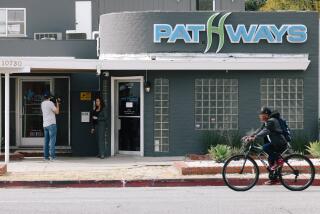Kevorkian Compares His Actions to Those of Gandhi : Trial: Defiance of Michigan assisted-suicide ban is form of civil disobedience, he testifies. He also says he acted to end suffering.
- Share via
CHICAGO — Jack Kevorkian had his day in court on Wednesday, comparing his actions in assisting the suicide of a terminally ill 30-year-old man to the civil disobedience of Mahatma Gandhi--and the martyred Gandhi, he added, “got what I did.”
By turns smiling and testy on the stand, Kevorkian expounded on his philosophy of “medicide,” acknowledging in response to the prosecutor’s questions that he would like to see experiments performed on willing suicides as they die, and that he has advocated auctions of their organs for transplants.
Such practices, Kevorkian said, could save the lives of others, but he predicted that they won’t be accepted until “the future because society is not ready for it. We’re not far enough out of what I call the Dark Ages.”
He called for oversight of assisted suicides by panels of doctors and said politicians should stay out of the process. He also, however, condemned medical organizations for opposing assisted suicide.
Indeed, he said, he never consulted the neurologist treating Thomas Hyde, whose death in August led to the charge for which Kevorkian is on trial, “because colleagues don’t cooperate.”
Worried that Hyde’s suicide plans might be thwarted, “for (Hyde’s) sake, for his protection, I did not call his doctor.” Kevorkian said.
Kevorkian’s trial in Detroit, televised live on Court TV, is the first test by jury of Michigan’s ban on assisted suicides, though the verdict will not be the last word on the subject.
The Michigan Court of Appeals is still reviewing the law, and the ban itself expires in November. The Legislature is expected to consider a permanent response to the issue of whether physicians should be permitted to end pain and suffering by ending the lives of those who wish to die. The retired pathologist also is collecting signatures for a ballot measure proposing to amend the state constitution to allow assisted suicide.
If convicted of violating the ban, Kevorkian could face a sentence of up to four years in prison and a $2,000 fine. He has been present at 20 suicides since 1990, five since the ban took effect in 1993.
Three other charges against Kevorkian were dismissed when local judges ruled the suicide ban unconstitutional.
In this case, before Detroit Recorder’s Court Judge Thomas E. Jackson, Kevorkian’s defense lawyer has avoided a head-on challenge to the ban.
Instead, attorney Geoffrey N. Fieger has argued that Kevorkian did not intend to cause Hyde’s death, but to offer relief. Hyde’s degenerative disorder had left him barely able to speak or swallow. He could not walk and was losing control of his arms. Muscle spasms caused cramping and involuntary changes in his facial expressions.
When Hyde used a string around his finger to start carbon monoxide flowing to a mask Kevorkian placed over his face, “I had surmised he would die,” Kevorkian said. “I expected his suffering to end.”
He added: “Thomas Hyde didn’t want to die. He did not want to die. He wanted his suffering to end.”
Fieger also has said Hyde’s death took place behind Kevorkian’s apartment in neighboring Oakland County, rather than in Detroit where Kevorkian surrendered to police and where the trial is taking place, thus calling into question whether Jackson’s court has proper jurisdiction.
On Monday, Jackson refused to dismiss the case and said he would let the jury decide the matter.
Kevorkian testified that he turned himself in on Belle Isle, a Detroit island park, because he was afraid that Oakland County authorities would harm him if they took him into custody. In public statements afterward, Kevorkian said: “I wanted to give the impression that (Hyde) died on Belle Isle, without being deceitful.”
More to Read
Sign up for Essential California
The most important California stories and recommendations in your inbox every morning.
You may occasionally receive promotional content from the Los Angeles Times.












